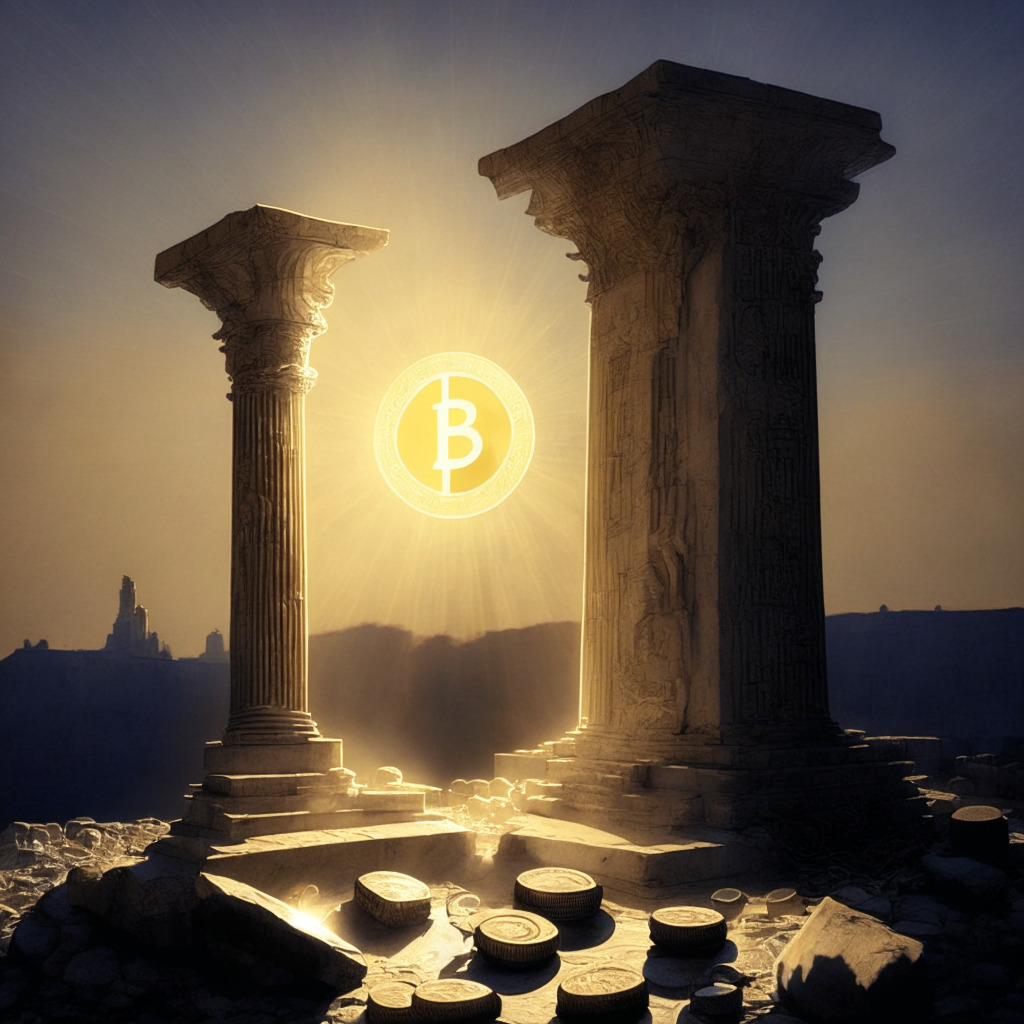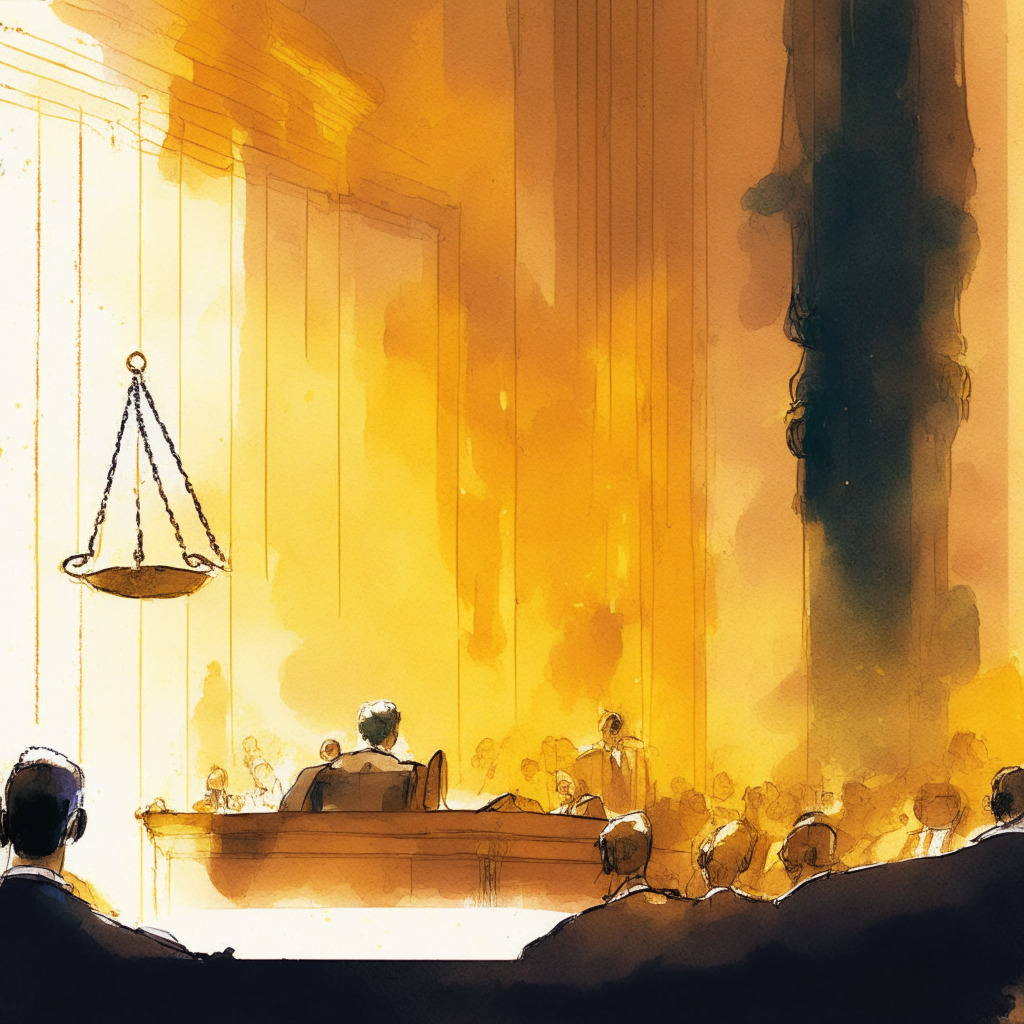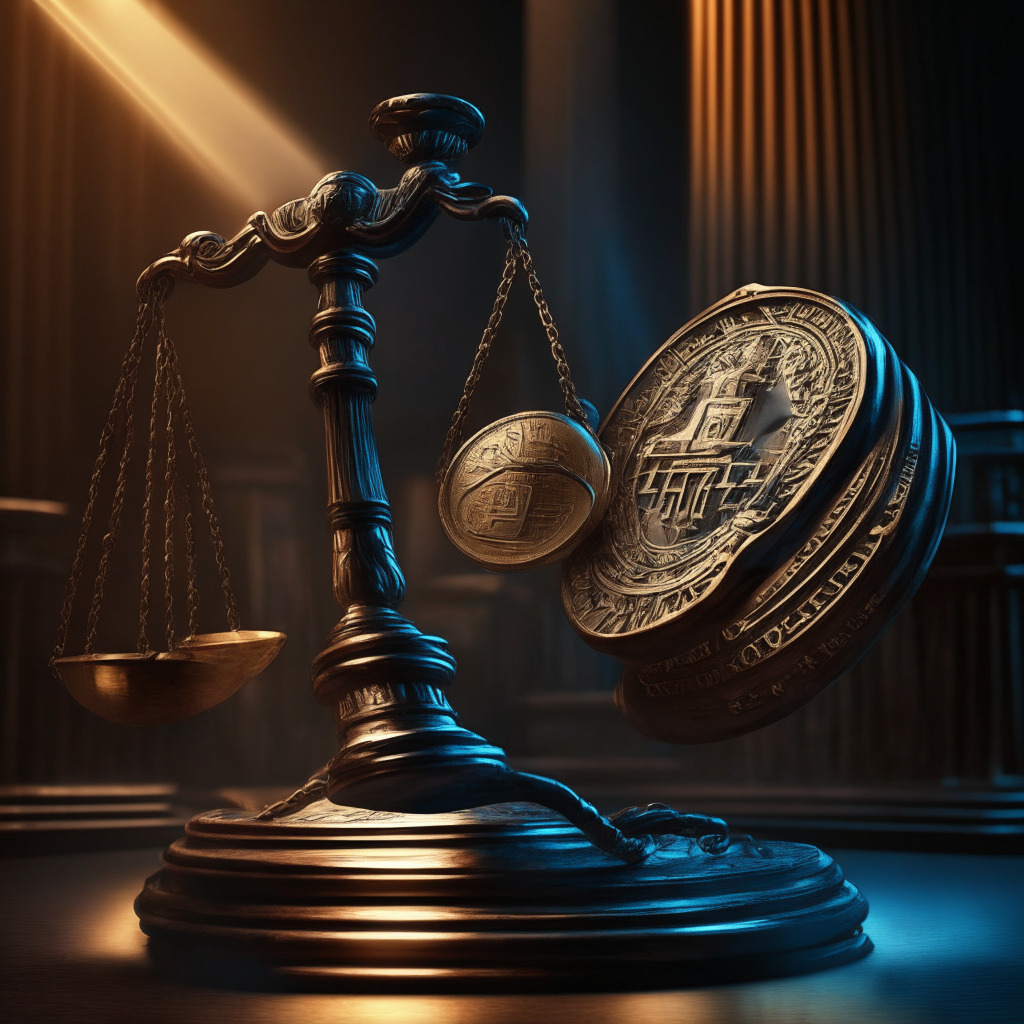“The Ethereum ETFs’ approval by the U.S. Securities and Exchange Commission symbolizes a crucial regulatory progression, and, despite low initial trading volumes, it opens the door for crypto market expansion. However, investor preferences and wavering organizational confidence could influence the ETFs’ success trajectory.”
Search Results for: U.S. SEC
Navigating SEC’s Stance: The Hopeful Resurgence of U.S. Cryptocurrency Industry
The resurgence in the U.S. cryptocurrency industry is driven by key victories by Ripple and Grayscale against the SEC. The shift is largely due to initial clarity from state authorities, conflicting regulatory statements from SEC and CFTC. Amid this, recent positive court filings and decisions may inject fresh liquidity into the market and encourage institutional investments.
U.S. DOJ’s Innovative Approach to Crypto-Related Prosecution: FTX Founder’s Tryst with the Law
The U.S. DOJ is shifting its legal focus on FTX founder, Sam Bankman-Fried, from treaty obligations to allegations of “illegal campaign finance” within a wire fraud charge. This new move involves combining diverse charges, shedding light on how Bankman-Fried allegedly intertwined illegal campaign finances within broader fraudulent and money laundering schemes.
Securities Clarity Act: Resolving Legal Questions and Shaping Crypto’s Future in the U.S.
The Securities Clarity Act, a newly introduced bill, aims to clarify that digital assets in “investment contracts” won’t be considered securities. If passed, it could resolve a heavily debated legal question and make it harder for the SEC to claim that various tokens are unregistered securities.
Cryptocurrency, China, and National Security: Navigating Advanced Chip Export Controls
Republican Representatives Michael McCaul and Mike Gallagher have appealed for stricter enforcement of export controls toward China, concerning advanced chips and their manufacturing tools. Their concern follows the launch of Huawei’s Mate 60 Pro, which uses advanced chips created by China’s SMIC, despite existing U.S. sanctions. They argue that current regulations insufficiently track China’s industrial strategy and military objectives.
Elon Musk vs SEC: A Battle Underscoring the Future of Crypto Regulations
“Tech magnate Elon Musk has challenged the SEC and DOJ, suggesting a “comprehensive overhaul” due to perceived abusive power use. The SEC’s probe into Musk’s massive Twitter purchase last year has ignited debates in the crypto community about the role of regulatory bodies in the industry. Musk’s recent acquisition of a currency transmitter license underscores his strong advocacy for crypto integration.”
Navigating the Cryptocurrency Investment Landscape amidst Ripple-SEC Turbulence
“While Ripple battles SEC allegations, cryptocurrencies like Trust Wallet Token, Bitcoin Minetrix, Avalanche, yPredict and GALA emerge as promising investment opportunities. Whether it’s Trust Wallet Token’s bullish trend, Bitcoin Minetrix’s stake-to-earn model, AVAX’s uptick, yPredict’s forthcoming AI-powered analytics platform, or GALA’s strong gains, these cryptocurrencies indicate valuable developments in the sector.”
Coinbase vs SEC: A Case of Interpretation in Crypto Regulation Compliance
The SEC accuses Coinbase of non-compliance in the registration as a securities exchange, an accusation Coinbase counters by declaring cryptocurrency transactions don’t resemble traditional investment contracts. The lawsuit’s pivot point is the interpretation of the “Howey test” for classifying assets as securities. Coinbase maintains the assets on its platform are not securities and exist outside SEC’s jurisdiction.
Regulatory Rift: CFTC and SEC’s Differing Visions for Crypto Governance
“U.S. financial regulatory chairs voice differing perspectives on governing the crypto industry. Rostin Behnam of the Commodity Futures Trading Commission urges for new laws encompassing 70% of the crypto sector as commodities while SEC Chair Gary Gensler maintains current securities laws are adequate.”
Navigating Regulatory Tensions: SEC’s Scrutinized Actions Against Binance and the Crypto Future
The SEC’s attempt to enforce stricter regulations around operations of major cryptocurrency exchanges, including accusations against Binance, has sparked debate. Questions are being raised about SEC’s use of lawsuits to change regulations, and its consistent use of the Howey Test for identifying securities. Not all digital assets, including certain stablecoins, believe they should be classified as securities. This situation challenges the crypto community to contemplate the impact of such regulatory actions on the future of cryptocurrency.
Unraveling the Crypto Carousel: SEC vs Binance, and the Circle Defence
The blog post discusses the legal fight between the SEC and cryptocurrency exchange Binance over the classification of digital assets as securities. It also touches on Circle’s argument that stablecoins linked to the U.S. dollar, such as BUSD and USDC, shouldn’t be categorised as securities. The outcome of the legal battle could greatly impact the future of cryptocurrency regulations.
SEC’s Bitcoin ETF Decision Delay: A Strategic Extender or Investor Protector?
The U.S. Securities and Exchange Commission (SEC) has postponed ruling on applications for spot Bitcoin exchange-traded funds (ETFs), including from big players like BlackRock and Invesco. This delay coincides with the possible U.S. government shutdown and its impact on SEC’s operations. Despite pointed SEC caution due to investor protection concerns, industry optimism for a Bitcoin ETF approval is rising.
Court Overrules SEC’s Dismissal on Bitcoin ETF: A New Dawn for Grayscale or a Risky Bet?
A US federal judge recently overturned the SEC’s dismissal of Grayscale’s proposal to convert its Bitcoin Trust (GBTC) into an ETF, causing ripple effects in the crypto market. Analysts project a 75% likelihood of spot Bitcoin ETF acceptance in 2023. This may lead to substantial consequences for the crypto market, potentially boosting Bitcoin price and possibly paving way for Ethereum’s approval.
Green Light for Ethereum: Pros, Cons, and Implications of SEC’s Approval of Valkyrie’s ETF
The U.S. Securities and Exchange Commission (SEC) has approved Valkyrie Investments to introduce the first exchange-traded fund (ETF) for Ethereum futures. This marks a critical juncture in digital asset investment in the U.S., supplementing Valkyrie’s existing Bitcoin Mining ETF.
Valkyrie’s Daring Move into Ether Futures Amidst SEC Delays: A Shake-up in Crypto ETF Scenario
“Valkyrie plans to offer Ether futures exposure to US investors amidst SEC’s delays on Bitcoin ETF. The firm intends to rename its Bitcoin Strategy ETF to include Ether, although SEC approval is pending. This move surfaces as several firms, including Valkyrie, await approval for spot crypto ETFs.”
FTX Pioneer Sam Bankman-Fried’s Legal Struggles: Is the U.S. Government Too Stringent on Crypto Leaders?
FTX founder, Sam Bankman-Fried, faces opposition from U.S. authorities for temporary release from jail prior to his trial. Accused with fraud-related charges during his tenure at FTX and Alameda Research, he pleads innocent. This situation casts a shadow over the future of crypto technology.
Divisive Lines: How SEC’s Gensler Grapples with Criticisms & Questions on Crypto Oversight
Gary Gensler, SEC Chair, recently faced criticism over cryptocurrency market monitoring. Critics accused him of stifling markets with excessive regulation, promoting a “woke” agenda, and lacked certainty in classifying Bitcoin. The future of cryptocurrency regulation remains a divisive topic among industry participants and lawmakers.
The Lure and Perils of Imminent Ethereum Futures ETFs Launch Amid U.S. Shutdown Fears
Bloomberg analysts predict the launch of Ethereum futures exchange-traded funds (ETFs) in the US, possibly accelerated by a potential government shutdown. The SEC might permit various Ethereum futures ETFs to launch next week. Despite previous failed attempts, analysts give a 90% chance of launching this October, but regulatory complexities and uncertainties remain a concern in the crypto market.
Fiery Standoff: Terraform Labs, SEC, and the Regulatory Conundrum in Crypto Sphere
Terraform Labs co-founder Do Kwon is battling with SEC questioning regarding the Terra Money collapse. Amidst jurisdictional complexities, a potential Montenegrin court hearing may assist SEC’s inquiries. The scenario highlights intricacies in crypto regulations, jurisdiction boundaries, legal rights, advertising integrity and presents a milestone in crypto jurisprudence.
Crypto Founder’s Stand-off with SEC: Impact on Future of Blockchain and Investor Trust
“Do Kwon, founder of Terraform Labs, resists a U.S. SEC extradition request following the implosion of his stablecoins, Terra and Luna, causing a massive loss in market value. The SEC accuses Kwon of misleading investors about Terraform’s stablecoin security. This case could shape future crypto world regulations and investors’ risk assessments for stablecoins.”
Crypto Regulatory Suspense: SEC’s Stance, Stakeholder Worries, and an Uncertain Future
“The U.S. House Financial Services Committee may subpoena the SEC over undisclosed documents related to FTX’s former CEO. The Committee claims the SEC’s lack of cooperation is compromising transparency and hindering digital asset ecosystem growth. This case demonstrates how regulatory bodies are scrutinizing the digital asset industry.”
Balancing Act: SEC Rules on Crypto and Its Implications on Innovation and Governance
“The U.S. Securities and Exchange Commission (SEC) focuses its powers on the crypto market, signaling the need for check and balances. SEC proposes rules for firms to analyze conflicts of interest while interacting with investors and levels the field between tech advancements and governance. The regulation and compliance could substantially impact the future of crypto world.”
Navigating SEC Delays and Approvals: The Future of Bitcoin ETFs
“The U.S. SEC has postponed a decision on the proposed ARK 21Shares spot Bitcoin ETF until January 10th, indicating the need for meticulous scrutiny of the suggested rule modification. The SEC’s deferral also affects other applications, suggesting a potential cascade of delays for spot Bitcoin funds.”
Trials and Turbulence: Navigating Legal and Security Challenges in Crypto Landscape
“Sam Bankman-Fried (SBF) is facing legal battles involving the U.S. Department of Justice, hampered by incarceration. His counsel argues for SBF’s unique insights in preparing the defense strategy. His case highlights complexities in the digital currency landscape, emphasizing the need for vigilance, adaptability, and expert help.”
Bipartisan Battle for Crypto: A Deep Dive into U.S. Digital Asset Regulation
Senators Kirsten Gillibrand and Cynthia Lummis have introduced a new crypto bill, the Responsible Financial Innovation Act, aimed at addressing regulatory ambiguity in the US cryptocurrency industry. This legislation could shift the oversight of most digital assets from SEC to the Commodity Futures Trading Commission.
Crypto Week Review: Binance vs SEC, Tether Lifeline for Tron and Controversy at FTX
This article explores recent developments in the crypto world, including the SEC’s setback in their investigation into Binance.US, the proposed dismissal of a lawsuit against Binance and its CEO, and delay in repayments by defunct exchange Mt. Gox. Noteworthy is Tether’s decision to authorize $1 billion USDT to the Tron network, a lawsuit against FTX founder’s parents, and Grayscale filing for a new Ether futures ETF.
CoinShares’ Bold Move into the US Amid Regulatory Uncertainty and Security Concerns
“CoinShares, a major European crypto asset firm, is establishing a U.S. hedge fund division to cater to the increasing demand for crypto-based products. Despite regulatory challenges, CoinShares aims to seamlessly connect the traditional finance sector with the digital asset industry, offering a range of investment products.”
Unraveling the Binance vs SEC Saga: A Landmark Battle in Crypto Regulation
Binance, Binance.US, and Changpeng Zhao are legally challenging the U.S. Securities and Exchange Commission, arguing it overstepped its bounds. The crux of the conflict lies in the question of whether the SEC has the right to retroactively regulate the emerging crypto markets. Binance contends that the SEC should have established clear crypto sector guidelines before taking legal action. They also challenge the SEC’s attempt to hold them accountable for crypto asset sales dating back to July 2017, during a time of unclear regulatory norms for crypto.
Defending Crypto: John Deaton’s Champion Stance for LBRY against the SEC’s Heavy Hand
“After facing a hefty penalty from the SEC, LBRY gains support from renowned attorney John Deaton for their appeal case. Despite setbacks, there’s industry optimism after recent court victories by Ripple and Grayscale against the SEC. Cryptocurrency stakeholders dispute the SEC’s decision due to its impact on the industry.”
Public Disclosure of Binance US documents: A Critical Turn in SEC’s Crypto Regulations Battle
“The conflict around Binance US’s alleged operation of unregistered securities and practice of wash sales has caught community attention. The disclosure of confidential documents by the SEC sheds light on its case, offering insight into the intricate web of U.S. cryptocurrency market regulations, providing a more transparent view of this regulatory battle, and possibly setting a precedent for future U.S. approach to regulating crypto assets.”
Escalating Tensions Between SEC and Binance.US: Pros, Cons, and the Underlying Blockchain Battle
The U.S. Securities and Exchange Commission (SEC) accuses Binance.US and BAM of possibly violating federal securities laws due to their staking, clearing, and brokerage services. The SEC’s concern revolves around Binance.US’ reliance on a custody provider, Ceffu, potentially leading to violations of prior agreements. Binance.US denies any wrongdoing, while regulation pressure continues to increase. This situation illustrates a broader discussion surrounding crypto regulation nuances, transparency, investor protection, and maintaining decentralization.
Stoner Cats NFTs: SEC’s Unanticipated Role in Skyrocketing Their Value
“Stoner Cats, a web series powered by NFTs, has been fined $1 million by the U.S. SEC and is required to establish a ‘Fair Fund’ to reimburse supposedly disenfranchised investors. Despite this, Stoner Cat NFTs are trading 250% higher than before the news broke, suggesting some see the SEC action as a potential profit opportunity. This highlights the complexities of NFT regulation.”































